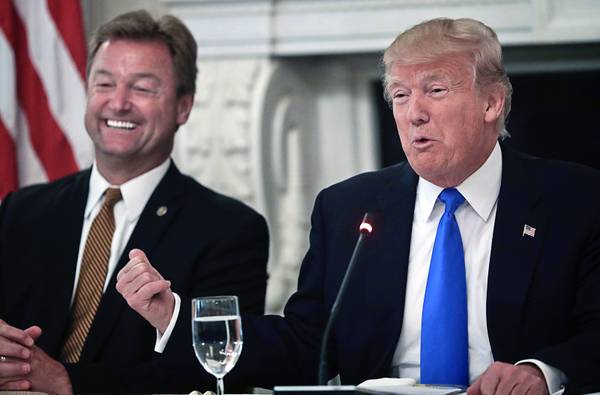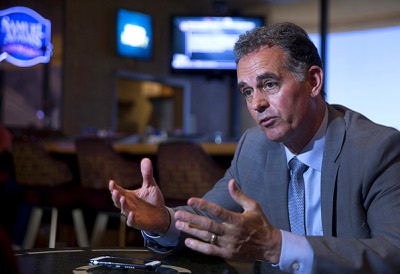Nevada’s Republican incumbent senator, Dean Heller, is running in a less-competitive primary now that the president pushed out one of his main contenders, Danny Tarkanian. Days after Donald Trump urged Tarkanian to run for a House seat instead of running against Heller, Tarkanian filed to run for Congressional District 3.
Heller has slammed Tarkanian as a perennial candidate who has been rejected by voters five times, while Tarkanian has attacked Heller over his mixed signals on the Affordable Care Act and Planned Parenthood funding.
So does this push of support from the president make Heller Trump’s man? It remains unclear.
Heller has voted for and against repealing Obamacare, and the pro-life candidate sowed confusion after his comments about federal dollars for Planned Parenthood. “I have no problem with federal funding for Planned Parenthood,” Heller said during an April 2017 town hall meeting. But in February he told the Nevada Appeal, “I do not support federal funding for abortions,” (abortion services make up about 3 percent of the health care provided by the organization and are not paid for with taxpayer dollars). He supported the president’s tax reform efforts, appearing in the background with him in announcing the law’s passage, and said he helped write the bill and is using it in his campaign materials.
In turn, Vice President Mike Pence recently appeared alongside Heller at a rally in Nevada, and Trump reportedly said in a closed-door meeting Feb. 1 that he would travel to Nevada to support Heller.
Michael Green, UNLV associate history professor, said there was a time in Nevada when politicians could say one thing in Northern Nevada and then say the complete opposite in the south, but the internet and 24/7 news make it harder to backtrack.
“If Dean Heller suddenly decides he is no longer Donald Trump’s man, there is a lot of evidence of him trying to be Trump’s man,” Green said. “Similarly, there’s evidence of him not being Trump’s man. That’s certainly part of the problem he faces.”
A history of shifts on the political spectrum
A 2014 Pew Research Center survey of 10,000 American adults found that from 1994 to 2014, there was increasing animosity from both Republicans and Democrats toward the opposing party. The number of moderates also decreased, meaning there were fewer Americans balancing conservative and liberal views.
As both parties moved to further ends of the spectrum, the tea party movement took shape in 2009, following Barack Obama’s victory in the 2008 presidential election. Tea party adherents were outspoken against taxation and government interference in the private sector at a time when big banks and car manufacturers were in need of federal help to stay afloat.
Though the tea party had mixed success in elections, the influential House Freedom Caucus was made up of many of the movement’s veterans in 2015, according to Pew Research. The caucus took credit, according to CNN, for a failed effort to repeal and replace Obamacare that the group said fell short of what was needed, with compromises to bring more conservatives on board driving some moderates away instead.
In Nevada, Green said, Republican Sharron Angle was the tea party favorite who unexpectedly won her primary against Sue Lowden and Tarkanian. She lost to former Democratic Sen. Harry Reid in the general election. Going back to 2006, Green said, Heller had a reputation for being a moderate in the Legislature and as secretary of state, and started running to the right when he came up against Angle in a House race that year.
“There is a recent history of the right wing of the Republican party making its presence felt in elections like these,” Green said.
Trump and other factors
Green said Trump may be pushing some moderate candidates to the right, but that contested primaries also play a role. On the Democratic side, the primary between Clark County Commissioners Chris Giunchigliani and Steve Sisolak could pull Sisolak to the left or Giunchigliani closer to the center.
“There is a Trump effect, but we also can lose sight that there is a history of the party base and a quest for its support tending to drive candidates to the left or the right, depending on the party,” he said.
Republican presidents have a mixed track record of weighing in on major Nevada races. Green said President Ronald Reagan took a keen interest in Nevada, successfully campaigning in the state for Chic Hecht in 1982 but failing in 1986 with Jim Santini.
Former Sen. Paul Laxalt had backed Santini after Reagan told the retiring senator that he wanted to keep that seat red. The move had a major impact on Barbara Vucanovich’s decision not to run in the race. Vucanovich was at the time a two-term congresswoman representing all of the state except the heart of Clark County (that was then Reid’s district) and a close friend of Laxalt, Green said.
“Laxalt had a lot to do with her decision not to run,” Green said. “And while most of them undoubtedly ended up supporting Santini, a good number of Nevada Republicans, especially in rural areas, really resented Laxalt pushing Santini over Vucanovich.”
The White House in 1970 pushed Bill Raggio to run for a Senate seat rather than the governorship he wanted. Then-President Richard Nixon pushed Vice President Spiro Agnew to urge Raggio to run against Democrat Howard Cannon, only to appoint Cannon to a bipartisan commission.
“Raggio was furious,” Green said. “It cut him off at the knees because Cannon could legitimately say that the Republican president respected him, a Democratic senator. Not for that reason, Raggio lost. But Nixon certainly was involved in the campaign here.”
This story originally appeared in the Las Vegas Weekly.


